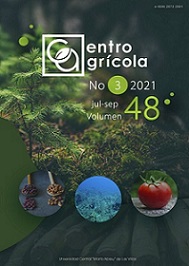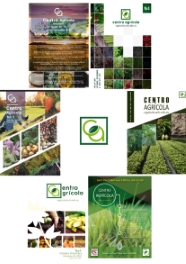CE:10215 CF: cag034162095
RESEARCH ARTICLE
Simple correlations and variability of five onion varieties (Allium cepa L.) in conditions of water deficit
Correlaciones simples y variabilidad de cinco variedades de cebolla (Allium cepa L.) en condiciones de déficit hídrico
Wilfredo Estrada Prado1, Elio Lescay Batista1, Alexander Álvarez Fonseca2 y Yariuska Caridad Maceo Ramos1
1 Departamento de Genética y Ecofisiología Vegetal, Instituto de Investigaciones Agropecuarias “Jorge Dimitrov”, Carretera Vía Manzanillo Km 16 1/2, Bayamo. Granma. Cuba. CP 85100.
2 Centro de Investigaciones, Servicios y Tecnologías Ambientales de Granma, Instituto de Investigaciones Agropecuarias “Jorge Dimitrov”, Carretera Vía Manzanillo Km 16 1/2, Bayamo. Granma. Cuba. CP 85100.
E-mail: This email address is being protected from spambots. You need JavaScript enabled to view it.; This email address is being protected from spambots. You need JavaScript enabled to view it.; This email address is being protected from spambots. You need JavaScript enabled to view it.; This email address is being protected from spambots. You need JavaScript enabled to view it.
ABSTRACT
Five onion cultivars were evaluated in three levels of soil moisture to determine the variables of greatest contribution to the total phenotipic variance in an experiment that was developed in the period 2008-2010 in the ¨Jorge Dimitrov¨ Agricultural Research Institute, Bayamo municipality, Granma province, Cuba. Fifteen treatments were used, distributed in a totally randomized design and a sample of 20 plants was taken at random in each treatment. The following indicators were evaluated: leaf length (cm), leaf number, false stem diameter (cm), equatorial bulbs diameter (cm), polar bulbs diameter (cm) and bulb yield (g plant-1). Beside the following indexes were evaluated: Yield Losses (YL), Geometrical Mean Productivity (GMP), Mean Productivity (MP), Relative Efficiency Index (REI), Drought Tolerant Index (DTI), Stability Yield Index (SYI), Susceptibility Drought Index (SDI), Harmonic Mean (HM) and Tolerance (T). A simple correlations analysis to determine the relationship between the variables evaluated and a principal component analysis to determine the variables of greatest contribution to total phenotypic variance was performed. The results showed that the equatorial and polar diameter of the bulb and leaf length explained 93.21 % of the total phenotypic variation and the variables of more contribution were, the indexes as well as the yield and their components, those that were correlated in a positive way among them, this demonstrates that a great relationship exists among the indexes evaluated with the components of the yield.





